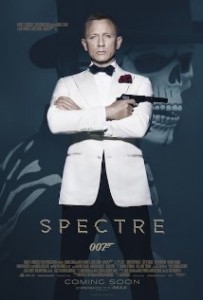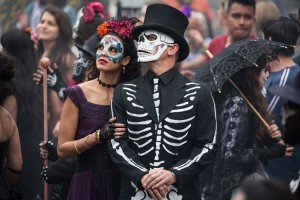 Bond, James Bond, is back in cinemas. Three years after Skyfall (2012), which was well received by critics and fans alike, Daniel Craig reprises his role as 007, the embodiment of machismo and style. Sam Mendes is back on board as director, and Thomas Newman returns as composer—all in an attempt to reclaim and build upon the franchise’s previous success.
Bond, James Bond, is back in cinemas. Three years after Skyfall (2012), which was well received by critics and fans alike, Daniel Craig reprises his role as 007, the embodiment of machismo and style. Sam Mendes is back on board as director, and Thomas Newman returns as composer—all in an attempt to reclaim and build upon the franchise’s previous success.
A pre-credit action sequence is a staple of Bond films, and Spectre’s certainly doesn’t disappoint. Bond is in Mexico City, decked out in a skeleton costume for a Día de los Muertos celebration and ostensibly “taking some long overdue holiday,” when he stumbles upon an assassin who leads him to uncover a secret criminal organization known as Spectre. This opening scene is by far the most impressive in the entire film on both visual and cinematic scale. The majority of the sequence is shot as a long take, which, far from feeling like ostentatious braggadocio on the part of Mendes or serving as a distraction to the viewer, adds a sense of urgency which the rest of the film lacks. Here Bond moves throughout the streets (and rooftops) of Mexico City with the sort of suave professionalism and ease for which he is known, and the camera dollies and cranes along with him, continually creating fresh mise en scène that captivates the audience. When a cut finally interrupts the oner, the internal and external rhythm of Spectre explodes (quite literally in one case), catapulting us into the chase sequence that brings us face-to-face with Sam Smith’s lackluster theme song.
 In a way, Spectre’s pre-credit scene is indicative of the film as a whole; just as our first encounter with Bond sees him disguised as a skeletal figure, so the film itself is somewhat barebones, an emaciated, spectral shadow of its predecessor, Skyfall. Ultimately, Spectre punches, kicks, explodes, and seduces its way through familiar territory in an all too familiar way. Bond chases a shadowy criminal organization, while simultaneously fearing his termination as corrupt bureaucrat C (Andrew Scott) attempts a hostile takeover of MI6. Léa Seydoux turns in an outstanding performance as the film’s ‘Bond girl,’ and Dave Bautista is the ultimate embodiment of a merciless henchman. Spectre is at its best when these two are onscreen. Without Seydoux, the film lacks a truly interesting character; action scenes without Bautista—which take place far too often—feel lackluster and sometimes derivative. Even Christoph Waltz, playing the part of villain, fails to induce any sense of dread. (He does not turn in a poor performance as much as he is hindered by a weak writing.) In spite of its bright moments, it all looks and feels like we’ve seen it before.
In a way, Spectre’s pre-credit scene is indicative of the film as a whole; just as our first encounter with Bond sees him disguised as a skeletal figure, so the film itself is somewhat barebones, an emaciated, spectral shadow of its predecessor, Skyfall. Ultimately, Spectre punches, kicks, explodes, and seduces its way through familiar territory in an all too familiar way. Bond chases a shadowy criminal organization, while simultaneously fearing his termination as corrupt bureaucrat C (Andrew Scott) attempts a hostile takeover of MI6. Léa Seydoux turns in an outstanding performance as the film’s ‘Bond girl,’ and Dave Bautista is the ultimate embodiment of a merciless henchman. Spectre is at its best when these two are onscreen. Without Seydoux, the film lacks a truly interesting character; action scenes without Bautista—which take place far too often—feel lackluster and sometimes derivative. Even Christoph Waltz, playing the part of villain, fails to induce any sense of dread. (He does not turn in a poor performance as much as he is hindered by a weak writing.) In spite of its bright moments, it all looks and feels like we’ve seen it before.
Spectre does, however, tread—no matter how ineffectively at times—on some interesting terrain. Concomitant to the aforementioned takeover of MI6 is an exploration of the pervasiveness of surveillance technology. Why do we need Bond when we can data mine and get drones to do our bidding, the film asks. This fascination with exploring a post-Snowden world says much about our greatest fears and desires, and I have written more extensively on that in other places.
 Additionally, Spectre continues the franchise’s recent foray into Bond’s fear of the past. It seeks to tie up loose ends and find an “author” of his previous woes. In other words, Spectre sees Bond at a crisis point in his services. The sins of the past—his lovers, his foes, and his failures—have caught up him. And while Bond may not be able to outrun his past, he is more than capable of shooting it to death, for his redemption can only be achieved through acts of regenerative violence. [1] It is interesting that Spectre sees that salvation is only possible through bloodshed. The Bible of course testifies that “without the shedding of blood there is no forgiveness of sins” (Heb. 9:22); but unlike Bond, we do not shed the blood of our enemies in order to find salvation and rest: our redemption is found in the shed blood of the Friend of Sinners.
Additionally, Spectre continues the franchise’s recent foray into Bond’s fear of the past. It seeks to tie up loose ends and find an “author” of his previous woes. In other words, Spectre sees Bond at a crisis point in his services. The sins of the past—his lovers, his foes, and his failures—have caught up him. And while Bond may not be able to outrun his past, he is more than capable of shooting it to death, for his redemption can only be achieved through acts of regenerative violence. [1] It is interesting that Spectre sees that salvation is only possible through bloodshed. The Bible of course testifies that “without the shedding of blood there is no forgiveness of sins” (Heb. 9:22); but unlike Bond, we do not shed the blood of our enemies in order to find salvation and rest: our redemption is found in the shed blood of the Friend of Sinners.
In the end, Spectre delivers a mildly entertaining entry into the Bond franchise that ultimately fails to meet the high mark set by its predecessor. Fans will no doubt find it an enjoyable film. But if you’re dead-set on seeing something as good or better than Skyfall, you’ll likely leave the theater a little disappointed.
- Here I borrow from some of the language used by Richard Slotkin in his book, Regeneration Through Violence: The Mythology of the American Frontier, 1600–1860 . ↩

Nice thoughts, Blaine. Your relation of the opening scene to the way the rest of the film falls together is a terrific. I felt it was not as good as Skyfall and Casino Royale but I was having trouble putting my finger on why. You captured that. Well done.
I also think your review is a terrific 🙂
Lol. Shutup. 🙂
Thanks, Gene! I really appreciate that. I always get nervous when I’m giving a negative or semi-negative review of a film that’s bound to be wildly popular.